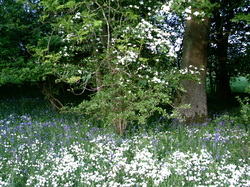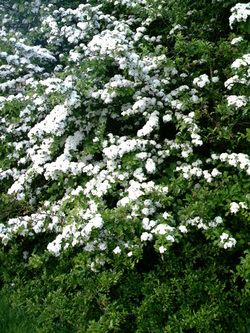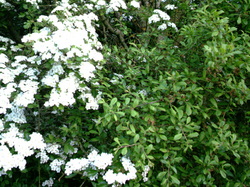|
From the early white snowdrops through the vibrant yellow infusion of February and March to the soporific blues of April and back to white again. The horse chestnut is in full bloom, clumps of greater stitchwort are lining the meadow and the yarrow is covering the verges - which reminds me of an old rhyme. If you put an ounce of Yarrow sewed up in flannel and placed under your pillow before going to bed, having repeated the following words, it was meant to bring a vision of your future wife (or hen, in my case):
'Thou pretty herb of Venus' tree, Thy true name it is Yarrow; Now who my bosom friend must be, Pray tell thou me to-morrow.' (Halliwell's Popular Rhymes, etc.) And the beautiful Hawthorn or May tree is in full bloom with masses of snowy white flowers. It is also known as the Whitethorn, as opposed to the Blackthorn. In the "Forest Minstrel," William Howitt sang this ditty: "The beautiful Hawthorn, that has now put on Its summer luxury of snowy wreaths, Bending its branches in exuberant bloom, While to the light enamour'd gale it breathes, Rife as its loveliness, its rare perfume. Glory of England's landscape! Favourite tree of bard or lover! It flings far and free Its grateful incense." And then of course there's the old favourite about not casting your clout 'til May is out. Which is probably sound advice about not changing your winter clothes for your summer ones until June, but might have something to do with the Hawthorn in bloom. Come to think of it, Lois hangs on to the last of her winter coat until June. But for the more reckless amongst you humans, it has been noted that you fling off your vests and long johns and reach for the open-toed sandals and socks at the first hint of warm weather. Lucky I have an all season jacket and don't have to bother with such matters! Gordon Spring has blossomed and the weather is hot! We haven't had a drop of rain for ages and the ground is rock hard. The level on the pond is receeding daily and there are lots of unfortunate tadpoles that have been left high and dry on the banks. Kizzie and Mum celebrated Easter Sunday with wine and chocolate eggs and all of us had a lovely weekend sunbathing. 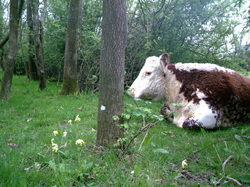 Lois and the cowslips Lois has turned her back on even the most tasty fragment of hay in favour of the lush grass that has grown in abundance. The bright and cheerful yellows of the daffodils and primroses and cowslips have given way to the bluebells and violets that perfectly complement the new shades of green. And so many different shades of green! 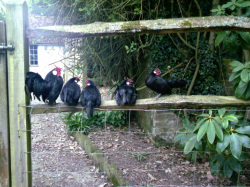 The Rosecomb gang by the Water Tower The Rosecomb gang are laying their eggs all over the place too. Under the cover of dense stinging nettles is a favourite - they are quite ingenious, if I say so myself. I have one tiny nephew who was born last week. I have named him Rod - Golden Rod. He is very cute and sharing a warm nursery with two baby Rosecombs and two baby Rumpless Game bantams. 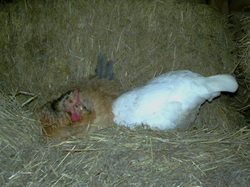 Do move over, Truffle Truffle and Mrs White vie for the nest in the straw bales each morning. Truffle usually wins. There are nests everywhere - we have a wren nesting in the potting shed. I watched the cock-wren building the shell of the nest - in fact he built several shell-nests and he took Mrs Jenny around to choose which she liked best. Mr Wren has several mates - and I'm not sure if Mrs Jenny knows! 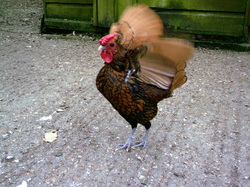 Oh Happy Days It really is a busy time. I heard the cuckoo this morning and Dad saw the swallow gang fly over the other day. The blossom on the blackthorn has faded and the green foliage is showing. Bracken shoots are rising from the dead leaves of last year and uncurling their fronds. Mum told me about a programme that she used to like called 'Happy Days' and The Fronds was in that. Strange to have a show about bracken leaves. Gordon Eggs were used as a pagan celebration to welcome spring and early Christians adopted the egg, with a chick emerging, to symbolise the resurrection and new life at Easter. The giving of eggs at easter celebrates a new beginning. The oldest tradition was to give hard-boiled chicken eggs, which had been painted or dyed using natural ingredients like onion skins but the modern custom is to give chocolate eggs. Kizzie is looking forward to Easter Sunday and the end of Lent so that she can eat chocolate eggs all day! Sylvia x
When Kizzie was at primary school every summer, just before the holidays, her class would come up to our farm and have a picnic and treasure hunt and activity day. It was really great fun and the teachers admitted that they looked forward to it even more than the children. One sunny June day the class of twenty eight boys and girls were making their way around the garden armed with their paper and pencils looking for flowers and trees and hidden nests. They trekked across the lower field, the fittest ones running ahead like cattle that had just been let out to grass after a long winter in the barn, shouting the answers gleefully. The next group, puffing to keep up, only stopping to write with difficulty by resting their paper on a chum's back - and the remainder walking slowly, very slowly - looking at the grass and sky, in a world of their own. And as they neared the picnic table on the lawn in front of the house, set out with jugs of orange juice and cakes and biscuits, they shrieked with delight and pointed and called to their friends to run faster. Not the jammy dodgers nor iced gems had caused such elation, but Lily, Sophie and Sally - three yearling Hereford heifers that were gathered around the table eating the aforementioned delicacies. Mum and Dad shooed them back into the paddock, much to their disappointment, but not before photos had been taken and that year's trip held a special place on the activities board in the school. Duff Hart-Davis, the journalist and author, once wrote about sending visiting children on an egg-hunt: 'There is no better way of entertaining - that is to say, getting rid of - visiting children than to send them on an egg-hunt; the discovery of clean, brown eggs nestling in a scoop of hay or straw is immensely satisfying to almost everyone. Yet hens display astonishing ingenuity in concealing their clutches; some do not give themselves away by cackling, and at least once a year we are amazed by the emergence of a mother and family from a nest whose existence we never suspected. On one occasion, I despatched a pack of small visitors to the farmyard with instructions to collect all the eggs they could find, promising 10p for every one over a dozen. I thought I knew my nests and settled down with the rest of the parents for a peaceful drink. Back came the children with fifty eggs. Some of them were old enough to have gladdened the heart of a Chinese chef; but since I had been foolish enough not to specify fresh eggs, I felt morally bound to pay.' 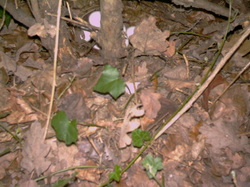 Hidden Nest I Dad was cleaning the car yesterday afternoon and happened to hear a little voice from the depth of the leaves in the hedgerow. Unable to contain her excitement, the littlest Rosecomb popped out of the roots and scuttled back to her family. No doubt they would have admonished her for her tell-tale chatter of achievement as Dad, with due difficulty it has to be said, spied a large cache of eggs hidden (secretly) away. 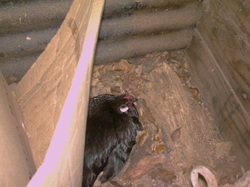 Hidden Nest II Later on as he was filling the bag with logs in the logshed he noticed a bright white speck in the very back corner. It was very dark apart from the shiny earlobe of the littlest Rosecomb's sister, sitting as still as still could be, hoping Dad wouldn't spot her. She was spread out over goodness knows how many eggs and for one so small, looked very large. Gordon 'Oak before Ash, we're in for a splash; Ash before Oak, we're in for a soak'.
And every spring we study the boughs of the two giants daily for the first sign of leaf. All has been well, although we weren't entirely convinced it was an accurate measure of the impending summer's forecast, until we discovered another rhyme which read: 'If the Ash before the Oak doth sprout There has been or there will be, drought.' Which contradicts the original verse and seems as if the author of the second hadn't found the first leaf to be a very reliable indication either! Anyway we have scanned the trees for the minutest sign and found it to be, without any shade of a doubt --- the Oak that is the winner! We have decided therefore to keep with the first rhyme and hope that we have a nice dry (but not too dry) summer! Sylvia x This morning is wet and windy - a rook morning. They complement the gusts with their raucous calls and swerve and tilt high in the trees as one with the wind. Yesterday was frosty and then sunny - it must be April! We spotted the first cowslip buds in the shelter of the edge of Lois's field and the Milkmaids (also known as Lady's Smock or Cuckoo Flower) are out in abundance. The blackthorn is out too and looks as if a light sprinkling of snow has graced the edges of the fields.
Our six white pigeons became ten one day last week - and very soon dropped to five this week. Mum and Honey and Harvey were walking through the woods on Saturday and a carcass with a few snow white feathers dropped almost onto Honey's head as they passed under a big Oak tree. They looked up to see Mr Buzz flying away - no doubt very annoyed at being disturbed during dinner. He had sat it out until they were directly underneath though! There was an array of white feathers in Lois's field yesterday too - fox dinner, no doubt. Perhaps the other newcomers have decided this isn't such a safe haven after all - and have left again. Mum and Dad brought us up some leftover pizza this morning - yum! Gordon x The first Bluebells are in flower, the Blue Tits are nesting, a Baby Moorhen was circumnavigating the pond, Lois' coat is shedding rapidly (with some help from the magpies), the Chiffchaff is chiff-chaffing away and the Gorse is looking resplendent. 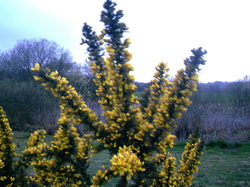 There are several varieties of gorse - or furze or whin as it is known, and between them, one or other variety is in bloom throughout the year - hence the saying 'when gorse is out of bloom, kissing is out of season.' I don't think they like severe frosts so are probably more suited to the warmer south and apparently they have no scent in the winter. I eyed the brilliant yellow bloom warily - too bright for my liking - and moved on to scratch in the soft earth. Today has been really quite warm and Dad has spent a busy weekend spring-cleaning our boxes and mowing the garden. And I am anxiously awaiting the arrival of my first nephews and nieces up at the cottage. Hopefully tomorrow. Gordon x Henry Stephens wrote in 'The Book of the Farm' in 1855:
'The hen-wife should visit every nest, and collect the eggs every day; and the time for collecting the largest number of eggs and disturbing the poultry the least, is in the afternoon between 2 and 3 o'clock, before the birds begin to retire to roost. A nest-egg should be left in every nest, as it is an established fact, that hens prefer to lay in nests containing eggs, to those which are empty. Eggs are most conveniently collected in small hand-baskets and a short light ladder will afford easy access to nests situated above reach from the ground. Nine eggs weigh about a pound.' The hen-wife must have had a good memory and been able to recognise the egg that she had left from the previous day, or had upon her person a quilly pen to mark the aforesaid egg, methinks! Sylvia xx |
About UsHello! My name is Gordon and I am a Gold Sebright and my best friend is Sylvia. She is a Silver Sebright. We live with our foster parents on a small farm in the country. We thought that we would put our take on life and what we get up to through the year into a diary for you. All the characters are real and the events are a true record, interpreted with a modicum of poetic licence. We hope you enjoy it. Love Gordon and Sylvia Archives
December 2018
|
